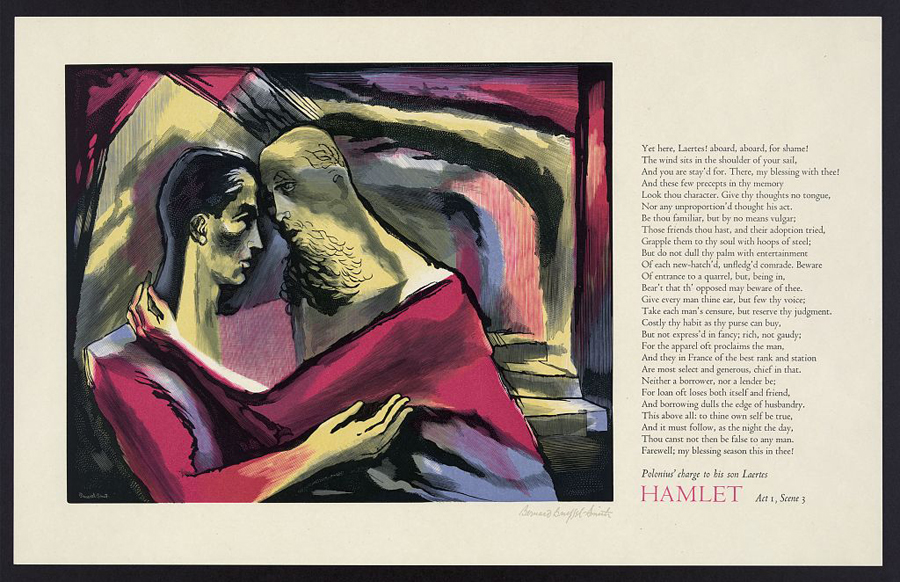Featured Source: Father & Son from Hamlet

Curator description: Bernard Brussel-Smith studied art at the Pennsylvania Academy of Fine Arts in Philadelphia and the New School for Social Research in New York. During the 1940s and 1950s, Brussel-Smith established himself as America’s foremost wood engraver. In this scene from Hamlet, Polonius, chief minister of the evil King Claudius, gives advice to his son, Laertes, as the young man leaves for school in France. Using himself and his son Peter as the models, Brussel-Smith depicts the love between father and son through a series of broadening circles. According to the folder in which the woodcut is enclosed, “The many hot and cold colors reflect the changing states of a man’s mind. The long passageway and steps to the right of Polonius suggest the years of experience, knowledge, and wisdom that man accumulates through the days of his life. In back of Laertes, the Gothic-like portal with its bright light points the way to roads yet untraveled that each youth must take during his own life.” Brussel-Smith’s assessment of Polonius differs from that of Hamlet, who mocks Polonius as a “tedious old fool.” Hamlet and Laertes die in a duel when Laertes’s seeks revenge for Hamlet’s killing of Polonius, whom he mistakes for the king spying on him from behind a curtain. Polonius’ charge to his son Laertes Hamlet, Act 1 Scene 3 Yet here, Laertes! aboard, aboard, for shame! The wind sits in the shoulder of your sail, And you are stay’d for. There; my blessing with thee! And these few precepts in thy memory Look thou character. Give thy thoughts no tongue, Nor any unproportioned thought his act. Be thou familiar, but by no means vulgar. Those friends thou hast, and their adoption tried, Grapple them to thy soul with hoops of steel; But do not dull thy palm with entertainment Of each new-hatch’d, unfledged comrade. Beware Of entrance to a quarrel, but, being in, Bear’t that th’ opposed may beware of thee. Give every man thy ear, but few thy voice; Take each man’s censure, but reserve thy judgment. Costly thy habit as thy purse can buy, But not express’d in fancy; rich, not gaudy; For the apparel oft proclaims the man, And they in France of the best rank and station Are most select and generous, chief in that. Neither a borrower, nor a lender be; For loan oft loses both itself and friend, And borrowing dulls the edge of husbandry. This above all: to thine ownself be true, And it must follow, as the night the day, Thou canst not then be false to any man. Farewell; my blessing season this in thee!
